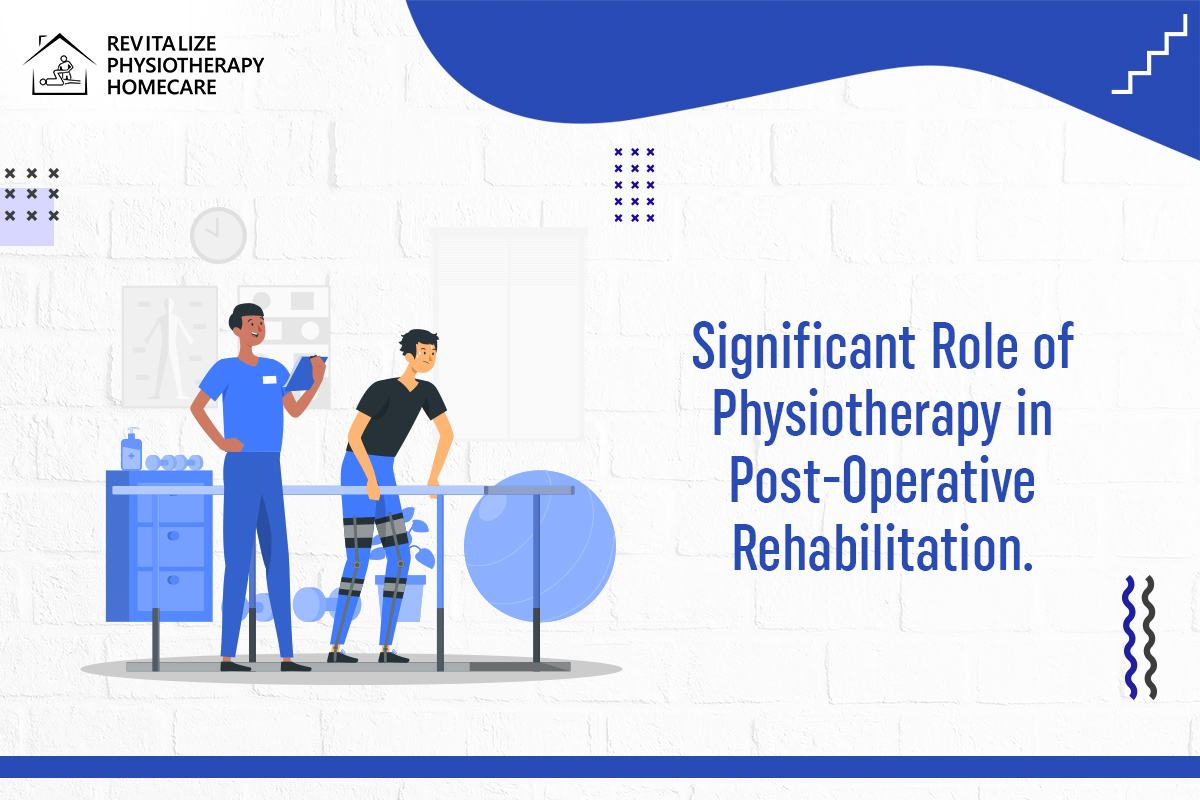Significant Role of Physiotherapy in Post-Operative Rehabilitation
When the pain due to chronic pain or injuries becomes unbearable; surgery is the only option you have. However, undergoing any kind of surgery is a big deal. Although, it helps patients get rid of his/her pain and serious medical conditions. It can cause people to become weak, immobile, in pain, and occasionally grief-stricken. Hence, post-operative care is crucial to ensure the success of any surgical procedure.
Among the arsenal of post-operative recovery, physiotherapy stands out for its pivotal role in recovery. It helps patients regain their strength, mobility, and full function. So that they can happily get back to the routine life they so love. Physiotherapy is a bridge from the vulnerability of surgery to the restored vitality of daily life.
This blog delves into the invaluable contributions of physiotherapy to post-surgical rehabilitation. Plus, explains why you should consider a Brampton Physiotherapist for a complete and speedy recovery. Thus, let's head towards the path of recovery with the physiotherapy clinic Brampton.
Who Qualifies for Physical Therapy Following Surgery?
Physical therapy is used as a post-surgery boost after a variety of surgeries, including:
1. Joint replacement surgery
Physiotherapy is necessary for knee, hip and shoulder replacement surgeries. To get better results, we recommend you start it as early as possible. Because intense physical therapy tailored to the patient’s needs under the supervision of a trained therapist is crucial. This helps patients regain mobility faster and get back to their routine.
2. ACL and Meniscus repair
After meniscal cartilage tears and the ACL knee ligament, which is frequently damaged in athletes, physical rehabilitation is essential. Research indicates that building quadriceps and hamstring strength can expedite the healing process and prevent re-injury.
3. Back surgery
In cases like this, supervised physical therapy is crucial due to the extremely sensitive nature of a spinal fusion or disk surgery. To start your blood flowing again and build up to daily activities, your therapist will assist you with mild stretches and exercises.
4. Heart attack/bypass surgery
Physical therapy can help patients avoid cardiopulmonary issues by allowing them to move safely. Being able to engage in progressive, low-impact exercise under supervision enhances health. Plus, it can also shorten a patient's hospital stay.
The Role of Physiotherapy in Rehabilitation & Post-Op Care
Physiotherapy can help people heal faster and avoid complications. It also aids in preventing re-injury by addressing pain management, oedema reduction, range of motion, and mobility. It helps in muscle and tissue strengthening, balance and coordination.
According to clinical research, post-operative physiotherapy can significantly reduce hospital stays. Along with improving functional abilities and quality of life, it also reduces the chance of complications.
Pre-Operative Physiotherapy
Pre-surgery physiotherapy plays a crucial role in gearing up patients for an operation. As well as ensures a smoother post-surgery recovery. It typically unfolds in three strategic steps:
1. Assessment of Patient’s Physical Health
A physiotherapist begins by meticulously assessing the patient's range of motion, strength, functionality, and balance. They also take note of any pre-existing conditions or injuries that may affect post-surgical healing. This in-depth evaluation is pivotal for crafting a personalized care plan. So that it aligns with the patient's unique health profile.
2. Preparation for the Operation
Equipping patients with knowledge about the surgical process and post-operative expectations is a vital part of preparation. Physiotherapists educate patients on managing discomfort, mastering deep breathing, and adopting relaxation techniques. This preparation transcends physical readiness, encompassing psychological support to alleviate pre-surgery nerves. This positively influences the recovery experience.
3. Setting Rehabilitation Milestones
Together with their physiotherapist, the patient decides on the post-operative rehabilitation objectives. Setting reasonable and measurable goals provides patients with clear benchmarks to strive for when regaining mobility and function. Pre-operative treatment plays a crucial role in the development of a customized exercise program. As it emphasizes flexibility, strength enhancement, balance, and pain management.
Overall, pre-operative physiotherapy lays a foundational bedrock for successful surgery and expedited healing. This proactive measure ensures patients are prepared for the physical aspects of surgery. Also, mentally poised for the challenges of post-operative recovery.
Post-Operative Physiotherapy
Following surgery, physiotherapy is frequently a crucial component of the recovery process. It aids in the patients' return of strength and movement. Patients and the physiotherapy centre in Brampton work together to develop a tailored treatment plan. It contains mobility and range-of-motion exercises to aid in the reduction of swelling and inflammation. Below is the significance of physiotherapy after surgery.
1. Accelerating Recovery
Post-operative physiotherapy expedites the healing process. Through targeted exercises and therapy, patients can heal faster than with rest alone. A physiotherapy clinic in Brampton employs these regimens to reduce recovery time. And that is crucial for those eager to return to their normal lives.
2. Alleviating Pain
After surgery, discomfort and pain are common. Physiotherapy uses techniques like massage, heat treatment, and electrical stimulation to ease pain. This approach not only provides immediate relief but also helps in reducing the dependency on pain medication.
3. Restoring Function and Movement
Surgical procedures can affect mobility. The best physiotherapist in Brampton focuses on specific exercises to restore function. Gradual progression through physiotherapy helps patients return to their pre-surgery levels of activity. This ensures a return to normalcy with confidence.
4. Preventing Complications
Physiotherapy serves as a proactive guard against potential post-operative complications. (Such as blood clots, pneumonia, and stiffness.) Early mobilization, encouraged by a physiotherapist, is key to preventing these risks. As well as fostering a smoother recovery.
5. Customized Rehabilitation Programs
Every patient’s surgery and body response are unique. Consequently, physiotherapists prepare tailored treatment plans based on individual needs. This plan effectively addresses specific limitations and goals. Plus, ensures personalized care that optimizes outcomes.
6. Empowering Patients with Education
Physiotherapy includes education on optimal mobility skills and self-care routines during recuperation. Through skilled coaching, patients learn how to avoid reinjury and manage their recovery. Plus, become active participants in their own healing.
How Soon Should You Start Physiotherapy After Surgery?
Starting physiotherapy promptly after surgery is essential for optimal recovery. The timing can vary based on the specific procedure and individual patient considerations. Coordination with the surgeon for a tailored rehab plan is crucial.
1. Hospital-Based Physiotherapy
Physiotherapy sessions typically commence quickly following orthopedic surgeries. (Sometimes as early as 24 hours post-operation.) In the hospital setting, your physiotherapist will advise on the extent and frequency of movement for your affected limb or joint. Additionally, they will instruct you on using assistive devices. (Such as crutches or wheelchairs, if necessary.)
2. Continuing Care at Home
Upon discharge, you'll be equipped with a preliminary set of exercises to practice at home. Your physiotherapist will then expand on these exercises during your follow-up visit. Those are usually around two weeks post-discharge and may recommend ongoing physiotherapy services.
The initial six weeks after surgery are pivotal for preventing immobility-related stiffness and muscle damage. Post this period, the focus shifts to rebuilding strength in muscles and joints. The overall recovery phase may extend over several months, depending on the surgery's nature and the severity of the injury.
Conclusion
In the crucial post-operative phase, physiotherapy emerges as more than a treatment—it’s a partnership in healing. It addresses pain, promotes movement, and empowers patients with knowledge. Plus paves the way for patients to reclaim their health and vitality.
To book an appointment with the best physiotherapist in Brampton call 905-452-0222. You can email us at revitalizephysio@gmail.com.




